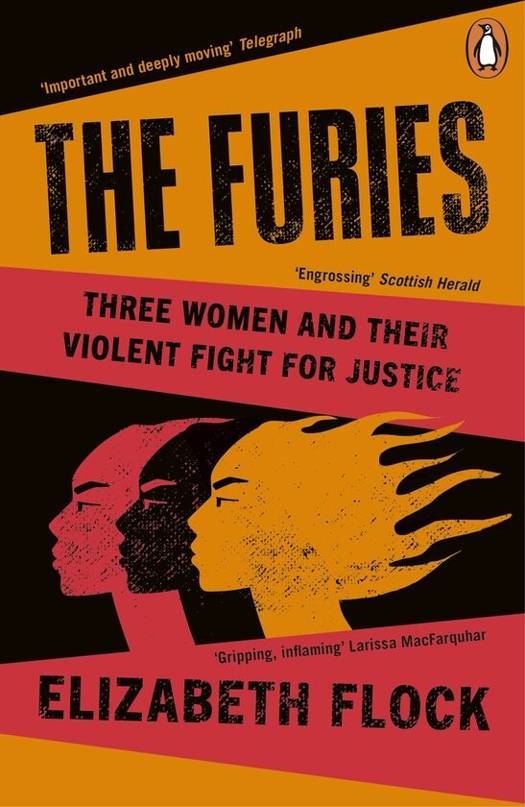
Je cadeautjes zeker op tijd in huis hebben voor de feestdagen? Kom langs in onze winkels en vind het perfecte geschenk!
- Afhalen na 1 uur in een winkel met voorraad
- Gratis thuislevering in België vanaf € 30
- Ruim aanbod met 7 miljoen producten
Je cadeautjes zeker op tijd in huis hebben voor de feestdagen? Kom langs in onze winkels en vind het perfecte geschenk!
- Afhalen na 1 uur in een winkel met voorraad
- Gratis thuislevering in België vanaf € 30
- Ruim aanbod met 7 miljoen producten
Zoeken
€ 15,45
+ 30 punten
Uitvoering
Omschrijving
Brittany Smith, a young woman from Stevenson, Alabama, killed a man she said raped her in her own home, but was denied the protection of a self-defense argument.
Angoori Dahariya led a gang in Uttar Pradesh, India, dedicated to avenging victims of domestic abuse.
Cicek Mustafa Zibo fought in a thousands-strong all-female militia that battled ISIS in Syria.
Can women's acts of vengeance help to create lasting change in their communities, or will they ultimately hurt their cause?
In this profoundly moving book, award-winning journalist Elizabeth Flock explores the stories of three women living in deeply patriarchal places with destructive cultures of honour, places in which institutions - government, police, courts - failed to protect women from violence, leaving them no option but to stand up and protect themselves.
Reviews:
'This is an arresting, deeply reported new book, which considers three case studies of women... who, when faced with institutional failures of various kinds, took matters into their own hands... Flock is a patient reporter who embeds with her subjects long enough to write about their inner worlds with authority and nuance.' - Rachel Monroe, The Washington Post
'The Furies delicately unpicks the lives of these three flawed, brave women in an engaging as well as thoughtful way... Elizabeth Flock's respect for her own story, as well as the stories told by Smith, Dahariya and Zibo, are testimony to her acceptance of the complexity of all our lives.' - Joanna Bourke, TLS
'Particularly incisive is Flock's assessment of the ways so-called justice systems pathologize and punish women... Flock's masterstroke [is the] immediacy and occasionally unnerving potency of her mythmaking... [The Furies] feels hopeful, even rebellious.' - Emily Ann Zisko, Los Angeles Review of Books
'These stories of women's vengeance are both harrowing and thrilling. Rosa Parks' defiance was a carefully planned political act; these begin as the opposite - sheer rage. This gripping, inflaming book, itself an act of fury, shows how revenge can transmute into politics or be crushed by it.' - Larissa MacFarquhar, author of Strangers Drowning
'The Furies is a remarkable and important exploration - reported with deep rigour and care - of what justice looks like for women who have been stripped of power and are trying to reclaim it.' - Rachel Aviv, author of Strangers to Ourselves
'Flock brings rigor and granularity to her reporting... the juxtapositions in The Furies provoke thought. We tend to see violent women as deviants, but as Flock recounts the stories of Smith, Dahariya and Zibo, their longings and indulgences, their fears, motivations and faults, she shows how mistaken this notion is. The violence in her book is committed by women who are in many ways perfectly ordinary... Flock has done a service by portraying her subjects' human complexity.' - Sanam Maher, New York Times
Angoori Dahariya led a gang in Uttar Pradesh, India, dedicated to avenging victims of domestic abuse.
Cicek Mustafa Zibo fought in a thousands-strong all-female militia that battled ISIS in Syria.
Can women's acts of vengeance help to create lasting change in their communities, or will they ultimately hurt their cause?
In this profoundly moving book, award-winning journalist Elizabeth Flock explores the stories of three women living in deeply patriarchal places with destructive cultures of honour, places in which institutions - government, police, courts - failed to protect women from violence, leaving them no option but to stand up and protect themselves.
Reviews:
'This is an arresting, deeply reported new book, which considers three case studies of women... who, when faced with institutional failures of various kinds, took matters into their own hands... Flock is a patient reporter who embeds with her subjects long enough to write about their inner worlds with authority and nuance.' - Rachel Monroe, The Washington Post
'The Furies delicately unpicks the lives of these three flawed, brave women in an engaging as well as thoughtful way... Elizabeth Flock's respect for her own story, as well as the stories told by Smith, Dahariya and Zibo, are testimony to her acceptance of the complexity of all our lives.' - Joanna Bourke, TLS
'Particularly incisive is Flock's assessment of the ways so-called justice systems pathologize and punish women... Flock's masterstroke [is the] immediacy and occasionally unnerving potency of her mythmaking... [The Furies] feels hopeful, even rebellious.' - Emily Ann Zisko, Los Angeles Review of Books
'These stories of women's vengeance are both harrowing and thrilling. Rosa Parks' defiance was a carefully planned political act; these begin as the opposite - sheer rage. This gripping, inflaming book, itself an act of fury, shows how revenge can transmute into politics or be crushed by it.' - Larissa MacFarquhar, author of Strangers Drowning
'The Furies is a remarkable and important exploration - reported with deep rigour and care - of what justice looks like for women who have been stripped of power and are trying to reclaim it.' - Rachel Aviv, author of Strangers to Ourselves
'Flock brings rigor and granularity to her reporting... the juxtapositions in The Furies provoke thought. We tend to see violent women as deviants, but as Flock recounts the stories of Smith, Dahariya and Zibo, their longings and indulgences, their fears, motivations and faults, she shows how mistaken this notion is. The violence in her book is committed by women who are in many ways perfectly ordinary... Flock has done a service by portraying her subjects' human complexity.' - Sanam Maher, New York Times
Specificaties
Betrokkenen
- Auteur(s):
- Uitgeverij:
Inhoud
- Aantal bladzijden:
- 293
- Taal:
- Engels
Eigenschappen
- Productcode (EAN):
- 9781405962193
- Verschijningsdatum:
- 28/02/2025
- Uitvoering:
- Paperback
- Afmetingen:
- 129 mm x 197 mm
- Gewicht:
- 218 g

Alleen bij Standaard Boekhandel
+ 30 punten op je klantenkaart van Standaard Boekhandel
Beoordelingen
We publiceren alleen reviews die voldoen aan de voorwaarden voor reviews. Bekijk onze voorwaarden voor reviews.









